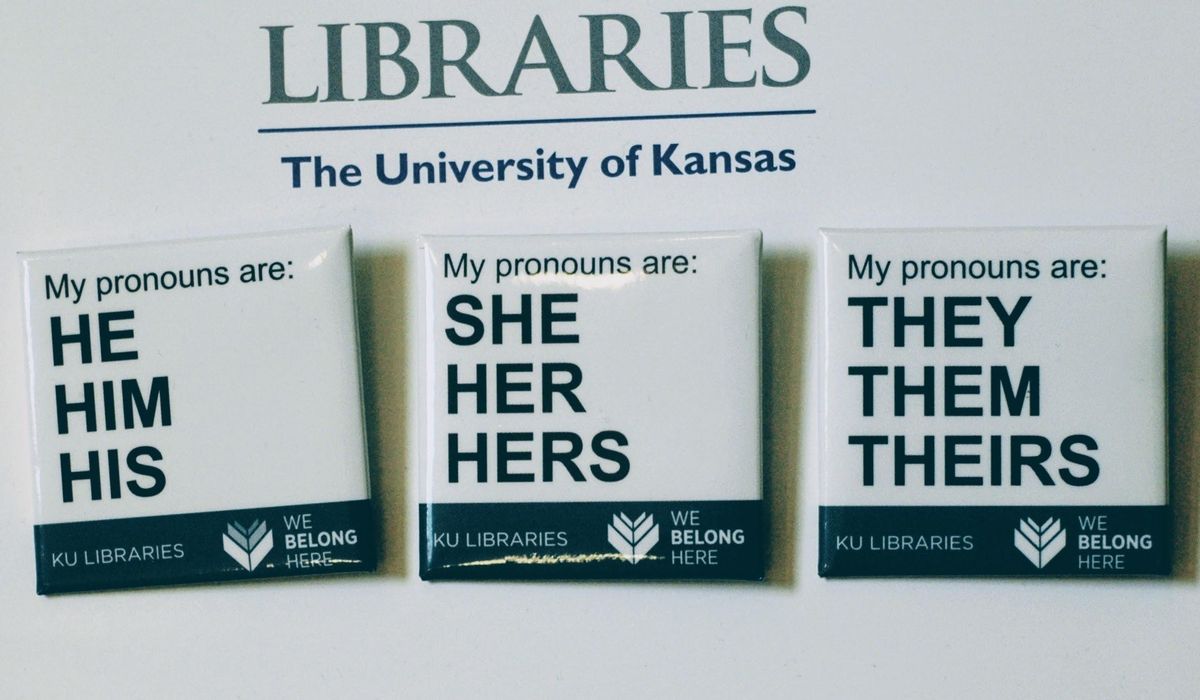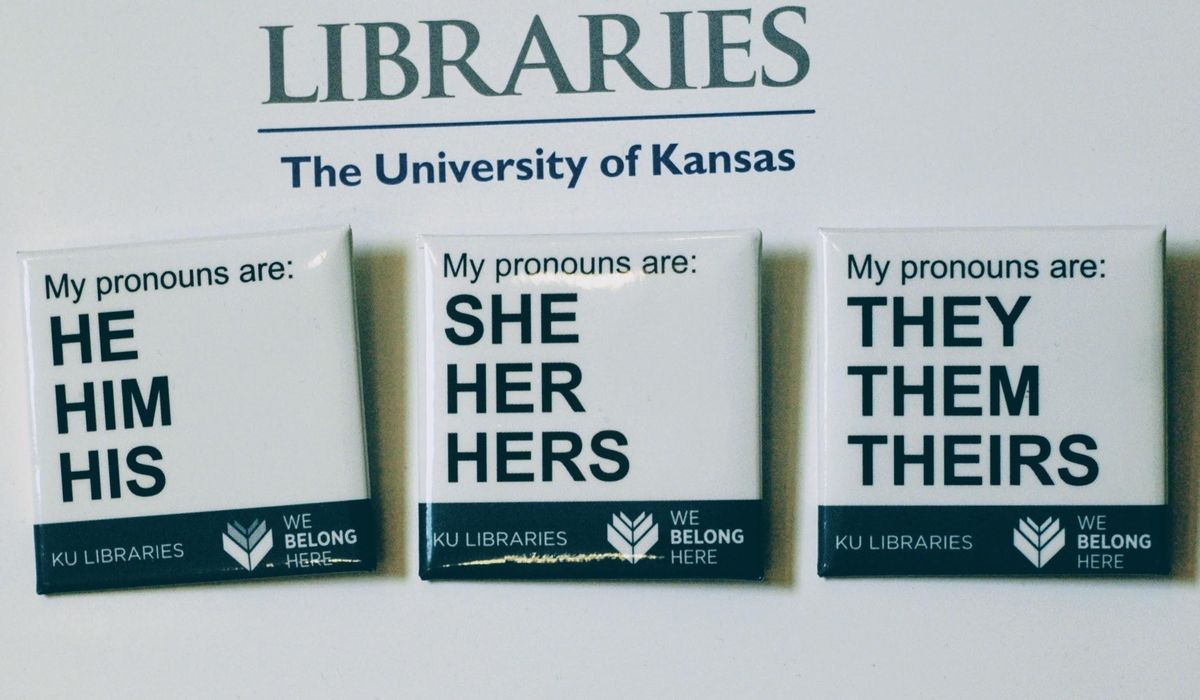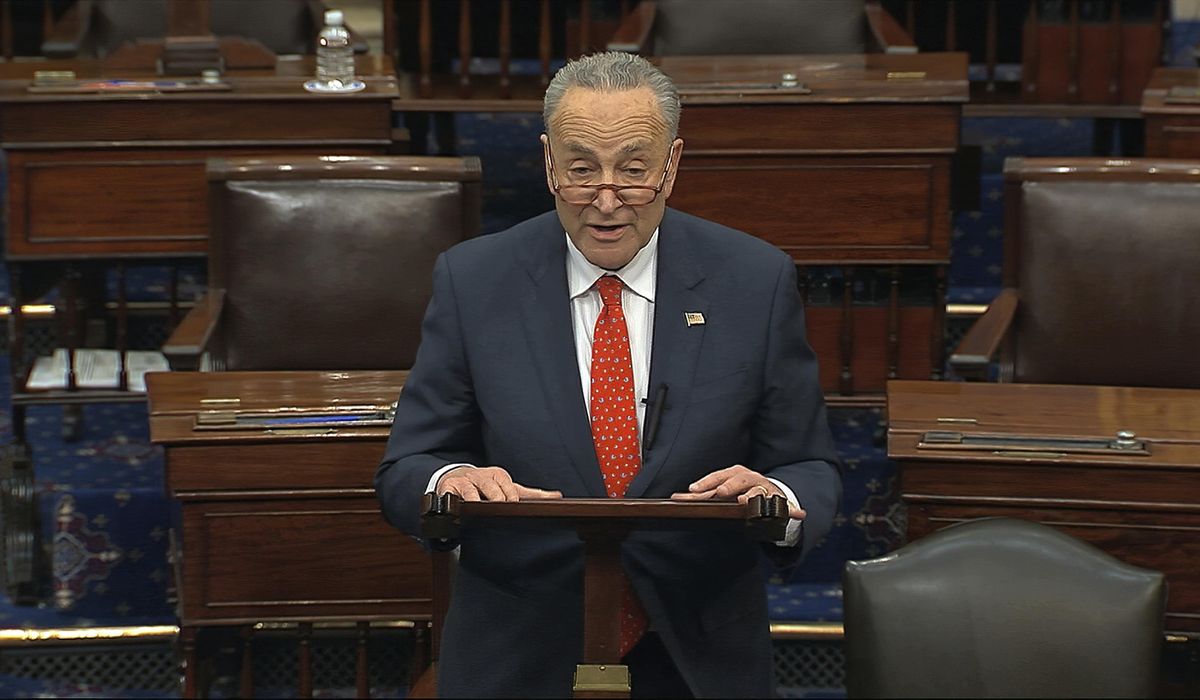
University of Pennsylvania transgender swimmer Lia Thomas has plenty of advantages in women’s sports, as far as critics are concerned, and one of them is pronouns.
Referring to male-to-female transgender people like Ms. Thomas as “she” and “her” has gone from being a matter of common courtesy to a near-universal expectation with social, political and legal consequences for those who resist.
Those in the trenches of the gender identity wars are pushing back.
“This is not just about a pronoun. This is about an ideology,” said Tyson Langhofer, senior counsel and director of the Alliance Defending Freedom’s Center for Academic Freedom. “This is about us as a society: Can we continue to discuss biological reality and the different laws and public policies that come along with it?”
No part of speech has drawn more ink in recent years than pronouns, which aren’t just for males and females anymore. “Neopronouns” such as “xe,” “ze,” “sie” and “co” refer to nonbinary people. The Associated Press gave its blessing in 2017 to the plural pronoun “they” for singular usage.
That said, the bulk of the attention has been on he said/she said.
Advocates for female-only spaces, including sports, prisons, restrooms and locker rooms, are taking on universities, corporations, news outlets and governmental entities as they increasingly adopt trans-friendly rules on gender markers in the name of fighting discrimination.
Those opposed to the preferred pronouns say the word choice conveys a political message in itself. They include the feminist Women’s Declaration International, formerly the Women’s Human Rights Campaign, which says it will “not use wrong sex pronouns under any circumstances.”
“This is a clear approach that reflects our understanding of reality; is not hateful, unkind, bigoted or extremist,” the campaign said on its website. “We are unable to safeguard women’s rights effectively while twisting our language to include men.”
Kara Dansky, author of “The Abolition of Sex: How the ‘Transgender’ Agenda Harms Women and Girls” (2021), cited the 2019 article “Pronouns are Rohypnol” by Barra Kerr, who argues that using chosen pronouns will “change our perception, lower our defenses, make us react differently, alter the reality in front of us.”
“What she means is that when we read in the media that Lia Thomas is a ‘she,’ for example, it does something to our brain. It very subtly does work to persuade us that Lia Thomas is female,” Ms. Dansky said. “The language is important on the psychology of a reader. This is a very subtle way and a very effective way that the whole gender-identity movement is persuading people to go along with the charade that men can be women.”
Others have drawn comparisons between preferred pronouns and, for example, the phrase “unborn baby” versus “fetus” in the abortion debate. The first scores points for the pro-life movement, the second for the pro-choice side.
“When [we] use this terminology, it’s impeding our — meaning those of us who are in favor of reality — it’s impeding our ability to win in the minds of the public and in the law,” said Ms. Dansky, president of Women’s Declaration International USA.
She dismissed “transgender” as a meaningless term for a “category of people for whom sex is irrelevant, which isn’t true.”
“We’re all either female or male, but the word ‘transgender’ does a lot of work in persuading Americans that it is a coherent category of people,” Ms. Dansky said. “And that’s why we’re having such a hard time fighting back against it.”
Her views fly in the face of LGBTQ activists, who hold that “trans women are women” no less than those with XX chromosomes and decry the use of “wrong” pronouns as examples of transphobia and bullying.
“When someone is referred to with the wrong pronoun, it can make them feel disrespected, invalidated, dismissed, alienated or dysphoric (often all of the above),” said the University of Wisconsin-Milwaukee’s LGBTQ+ Resource Center. “It is a privilege to not have to worry about which pronoun someone is going to use for you based on how they perceive your gender. If you have this privilege, yet fail to respect someone else’s gender identity, it is not only disrespectful and hurtful, but also oppressive.”
According to Campus Pride, at least 46 universities and colleges use students’ preferred pronouns on records and documents, and 667 allow students to use chosen names.
The Human Rights Campaign, which maintains the Corporate Equality Index, recommends that all workers identify their pronouns. “Asking and providing pronouns helps everyone avoid assumptions and feel comfortable interacting,” the LGBTQ advocacy group says.
In 2013, The Associated Press adopted a policy of identifying transgender people by using preferred pronouns or “the way the individuals live publicly.” Most major news outlets follow that guidance.
Critics say the policy has led to inaccurate and misleading coverage. The New York Times, The Washington Post and others recently hailed transgender trivia whiz Amy Schneider as the winningest female “Jeopardy” contestant in history, even though she was born a man.
Mary Hasson, the Kate O’Beirne fellow in Catholic studies at the conservative Ethics and Public Policy Center, said that “when someone asks you to use a different pronoun, they’re asking you to buy into their narrative, and it’s a different reality.”
“Once you give in to the pronouns, if you’re willing to call Amy’ she,’ then why would you draw the line and say, ‘Well, Amy’s not really a “she,” Amy’s a “he,” so Amy can’t be the highest-earning female?’” Ms. Hasson said. “You’re not going to do that. You’ve already bought in. The fact that they are looking for these achievements, of course they are, because it perpetuates this public adulation of males who are identifying as women.”
Whether Ms. Schneider is recognized as the most outstanding female “Jeopardy” champion may seem relatively harmless, but the implications go beyond a game show, Ms. Hasson said.
“Unfortunately, where women are most hurt is not with other female ‘Jeopardy’ contestants,” she said. “It’s the females who are in prison and who have some male predator who’s declaring himself a woman and wants to be their cellmate. Or even high school girls or women at Penn. Does Lia Thomas share the women’s locker room?”
One dilemma for critics of gender identity pronouns is how to take a stand without being rude.
Abigail Shrier, the author of “Irreversible Damage: The Transgender Craze Seducing Our Daughters” (2020), said she makes a distinction between the public and private arenas.
“By all means, we should refer to individuals however they prefer in private or in direct communication with them. I do,” she said in a January 2021 post on Substack. “But in the public sphere, we must be sticklers for truth. Not out of callousness to others’ feelings, but in order to cleave to objective reality — and to protect the women’s rights that are slipping away.”
The issue has wound up in courts as government officials seek to mandate pronoun usage in their anti-discrimination policies.
In July, a California appeals court cited free speech when it threw out a 2017 state law requiring nursing home staff to use a patient’s preferred pronouns. Transgender advocates condemned the decision.
“Deliberately misgendering a transgender person isn’t just a matter of opinion, and it’s not simply ‘disrespectful, discourteous or insulting.’ Rather, it’s straight-up harassment,” state Sen. Scott Wiener, a Democrat who sponsored the legislation, said in a statement in the Washington Blade.
Waging the free speech fight is the Alliance Defending Freedom, which represents educators at three public institutions who have been fired or disciplined for refusing to use students’ chosen pronouns.
The ADF has argued that repeating the pronouns would force the teachers to communicate a belief with which they disagree. The teachers were willing to use the students’ preferred names.
“Each teacher indicated, ‘Hey, I’d be happy to call you by any name you want, but I’m just going to avoid the use of a pronoun and refer to you with a name rather than a pronoun,’ and in every case, the school or the student rejected that proposed accommodation,” the ADF’s Mr. Langhofer said.
One of the instructors, Loudoun County Public Schools teacher Tanner Cross, was taken off administrative leave after the Virginia Supreme Court sided with him in August. The school board agreed in November to a permanent injunction.
The district said previously that Mr. Cross created “significant disruption” with his public remarks and that his free speech rights “do not outweigh the rights of students to be educated in a supportive and nurturing environment.”
Mr. Langhofer agreed that “all students must be treated with dignity and respect and that bullying or harassment is never acceptable by anybody.”
“But that’s not what this is about,” he said. “This is about enforcing an ideology. And this is about whether a school can punish students or teachers who respectfully refer to the student by their chosen name but decline to use a pronoun that they believe is communicating something that’s not true.”








